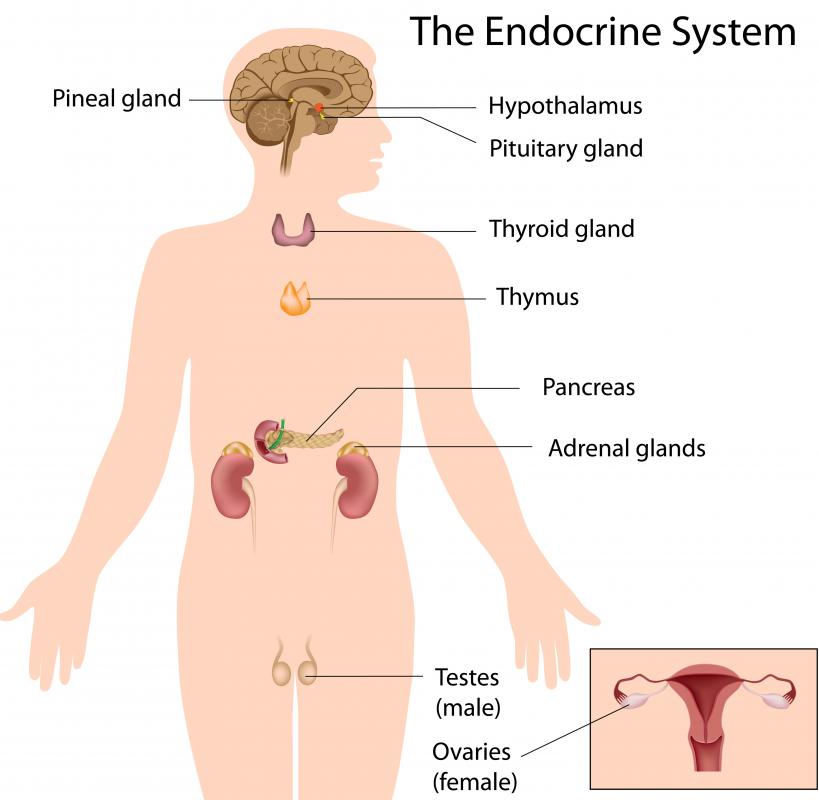At WiseGEEK, we're committed to delivering accurate, trustworthy information. Our expert-authored content is rigorously fact-checked and sourced from credible authorities. Discover how we uphold the highest standards in providing you with reliable knowledge.
What are the Different Types of Endocrine Hormones?
Types of endocrine hormones are not necessarily categories; rather, they are the hormones themselves produced by various glands of the endocrine system. They include cortisol, aldosterone, vasopressin, corticotropin, oxytocin, prolactin, thyroid, parathyroid, and thyroid-stimulating hormone. To the list can also be added dehydroepiandrosterone, epinephrine, norepinephrine, glucagon, insulin, estrogen, progesterone and testosterone. There are other hormones produced in the body, but they are not all endocrine hormones. Some of these hormones are of the type that influence only certain organs, and others exert an influence throughout the entire body.
The aforementioned endocrine hormones are universally considered the major hormones of the endocrine system. A very wide variety of bodily functions are stimulated, controlled and regulated by them. For example, cortisol has anti-inflammatory action, helps to regulate blood glucose levels and blood pressure, assists in the control of salt and water balance and helps to maintain strength in the muscles. Glucagon raises the level of blood sugar, oxytocin in females is responsible for the contraction of the muscles in the uterus and milk ducts in the breasts, and insulin lowers blood sugar level. It also influences the metabolism of sugars, protein and fat throughout the body.

Calcitonin, which is produced by the thyroid gland, assists in the construction of bone. Growth hormone, which is produced by the pituitary gland, the most important gland in the endocrine system, stimulates growth during a person's childhood. It stimulates cell reproduction during adulthood.
Cell reproduction is necessary to maintain muscle and bone mass after the body's growth process during childhood is complete. Some endocrine hormones are known by more than one name. For example, antidiuretic hormone is vasopressin which signals to the kidneys to retain water and, in conjunction with aldosterone, assists in controlling blood pressure.

Corticotropin, also known as adrenocorticotropic hormone (ACTH), controls the hormones that are produced and secreted by the adrenal cortex. Dehydroepiandrosterone (DHEA) affects bones, the immune system and even a person's mood. There are many glands in the endocrine system responsible for producing every type of the body's endocrine hormones.
The two most unique areas of production are the placenta and the pituitary gland. The placenta is an actual organ that forms and exists only during pregnancy and which behaves like an endocrine gland during pregnancy, in addition to handling other functions. The pituitary gland is known as the master gland because it produces a number of endocrine hormones, and the pituitary gland itself controls the function of most of the other endocrine glands.
AS FEATURED ON:
AS FEATURED ON:















Discussion Comments
I might be getting a treatment to balance out my androgen hormones pretty soon. I have chronic adult acne and it is not responding to anything. My doctor said that I might have an imbalance in my endocrine system hormones that's causing it.
He wants to do some blood work next week to check androgen levels. Apparently, this is the endocrine hormone that has receptors in our sebaceous glands and might be contributing to my acne.
I hope this will be the solution to my acne problem.
@burcin-- Well, they are all interconnected and work together interactively. Pituitary gland is important, but as far as I know, other glands also interact and try to balance out pituitary hormones as well.
I don't know about your personal condition, but I can tell you my experience with these endocrine hormones. I have hypothyroid, which means that my thyroid is not producing enough thyroid hormone. However, the endocrinologist diagnosed me when she saw that my pituitary hormone TSH was too high.
This didn't make any sense to me at first. But later, I learned that the pituitary gland has the job of watching and stimulating the thyroid. So when my thyroid doesn't produce enough hormone, the pituitary gland sends the TSH hormone to trigger it. The pituitary hormone in this situation is like the policeman who goes and knocks on the thyroid gland's door and tells it to produce more hormone.
The less thyroid hormone I have in my bloodstream, the more pituitary hormone I have to trigger it.
I believe all endocrine hormones are related to each other in one way or another and help each other to function properly. This is actually really good, because it helps doctors diagnose endocrine disorders more easily.
If the pituitary gland is the main gland, what happens if it malfunctions? Do the rest of the glands malfunction too?
Can someone tell me the connection between pituitary gland and thyroid gland and the hormones they produce? The reason I'm asking is because my doctor saw an abnormality in my thyroid hormones but kept mentioning the pituitary gland instead of the thyroid gland.
Are my thyroid hormones imbalanced because there is a problem with my pituitary hormones? I just don't understand how the different endocrine glands and hormones work together.
Post your comments